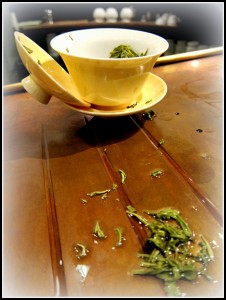We were driving in San Francisco. A friend suddenly asks: “would you like to live in Berlin?”
– No.
– Why not?
– German food isn’t good.
– What about London?
– Same thing. British food isn’t good either.
Then my friend started chastising me about how I haven’t lived in those two cities to know, how they have wonderful restaurants of various cuisines, and how I should be open-minded to try new things. True. But for me, “London has many good restaurants of various cuisines” has nothing to do with “British food is good”. Another example. I like yakisoba, and I like some yakisoba in San Francisco, but that just means I would prefer any Japanese city to San Francisco in terms of yakisoba. In order to like a city, I have to like its culture, and its regional cuisine happens to be the least personal cultural thing that pops up in my mind.
Edit: with Cheryl’s comment below, I think I should clarify a few things here: there’s ethnic restaurant, and then there’s fusion restaurant, both types make up the culture of a city. So, in a sense (and in the future), a fusion Chinese restaurant in London is just as “authentic” as an ethnic Szechuan restaurant in London, because they both make up the authenticity of London, the vibe of a big city, but neither can ever be as “authentic” as a Szechuan restaurant in Chengdu. With the globalization in big cities, the lines blur quickly, every ethnic thing is blended into other ethnic things, every plate contains ingredients and flavor profiles adopted from everywhere around the globe. That’s the beauty of cuisines, they always grow, they adapt to their surroundings and incorporate their surroundings to spawn new cuisines. A one-minute search on Google maps returns a cocktail bar in Shoredictch that serves up tamarind and onion jam on flat bread, and a fine dining restaurant in Kreuzberg that incorporates langoustine with wasabi, Cantonese style (whatever that means). These are just two of numerous Asian-flavor-inspired restaurants that I would easily find in London and Berlin, that I would most likely enjoy, but if you ask me, do you like London food, I wouldn’t think of them. Because I don’t consider them London food.
In fact, I don’t know what to consider them. We want to make good food, that’s great. Good fusion food is good. It has its own beauty, and I’m not totally against it. But the fusion happens too fast and too much to become a cuisine and to last. That Cantonese style langoustine with wasabi is served at 1 restaurant, by 1 chef, and will unlikely last for more than a decade. No German will ever say it is a German dish, on the same caliber as sauerbraten. So instead of fusing things together, why can’t we improve regional cuisines using the same ingredients that people in the region have used for hundreds of years, but with better techniques and higher-quality ingredients? If the trend is to mix everything together, what will become of regional cuisines? I like that Asian flavors are gaining appreciation among the Western palates. I think it’s wonderful. But what’s even more wonderful would be the authentic dishes of each culture getting appreciated on their own, no mixing, no “influence”.
People tell me that my taste bud will change as I eat more fusion food. Yes, it does change, but not in the direction that they mean. The more fusion food I eat, the less I’m impressed by fusion, and the more I want “authenticity”. Nobody ever agrees on the definition of authenticity, it has too many factors: land, people, ingredients, techniques, etc. For me, sometimes I think of authentic food as “food with history”, sometimes “localness”, but mostly, I want something pure.



Awww… Mai… I definitely disagreed with you, but I wasn’t trying to chastise you!
Here is my synopsis too:
London is not about fusion food. It is a city which has the best of so many different cuisines- authentic food ranging from Lebanese, Indian, Chinese, Japanese, British and the list goes on. Some of the best indian, Japanese and chinese food I’ve had at are in london. London just seems to attract the best chefs around the world because of its wealth and diversity. And I haven’t been to Berlin but according to Eric, he compared a ramen place to those we had in Japan, only better. What I make of that is that it probably isn’t fusion either.
In order to know that, one needs to have spent at least some time there and explored a bit, no?
My real point is that I hope you can be more open minded about cities other than Houston and Japanese ones! Apart from food there is a lot of culture and diversity, architecture, and history that cities like London and Berlin have to offer! But of course I am also quite an explorer and you “know what you like” so we will just agree to disagree… 🙂
Ps. Sorry for typos, I am using my phone.
By the way, you know that japanese hand rolls are fusion food right, I.e not “pure”? Actually it’s an american thing. You seem to like those 🙂 I like them too!
Cheryl, I know what you mean. 🙂 I was exaggerating when I said “chastise”, of course. (Friends can exaggerate with each other, right? 😛 )
I believe that the big cities can have good restaurants, but for me authenticity is more than just ingredients and techniques. You know how you always say we should go to Penang together to eat? Why didn’t you say we should try to find some Malay restaurants here or London instead, why go to Penang? Even if London has better Malay restaurants than Malaysia, I’d still prefer going to Malaysia. 🙂 The same applies for any other cuisine.
What do you mean by the hand rolls? Like California rolls and stuff? Of course I know those are American 😛 I like them just like I like Cheetos, and I’ve never thought of them as Japanese food. 😛
But yeah, I know we’ll always disagree on this hehe 😀
Mai, there you are again with authenticity, there is no such thing. It is not your palate that must change, it is your mindset, if what you want is change, or if what you want is to come to understand that all food should be regional. Japanese food is a fusion, as is Chinese food, even your own food of Vietnam, has influences of other cultures. Each dish is authentic to it’s location, it’s cook and it’s time. Ramen in Japan, is hardly the same now, as it was 10 years ago, much less 30 or 100 years ago. The noodle itself is not even native to Japan.
Such is the case with any other food or drink. I love fusion, as I see it in all things on my plate. If you resolve to never appreciate food, out of place, you will miss some great things to eat and drink. Someday, try eating Islamic Chinese food, or Burgoo in the lowlands of Carolina, Gumbo in Lousiana and know, that none of these foods represents anything but the fusion of cultures and traditions.
I think of food like I think of people. Yes, there are influences, but the difference between ramen and California roll and brisket with a miso rub (I just pull whatever ingredients out of my head) is like the difference between me and an American born Vietnamese and someone with an Irish great grandfather, a Mozambican great grandmother and a Vietnamese grandmother. Of course, you can say that I’m no more Vietnamese than they are, but I disagree. I’m hardly the same as I was 10 years ago, and I’m pretty sure there’s no such thing as pure Vietnamese blood either because people migrate, but I’m still more Vietnamese, and ramen is still more Japanese.
I will only accept that something is authentic when it has lived long enough, and when people crave it to fill their memory. Islamic Chinese is authentic to me, so is gumbo, (and what is burgoo?), but not some foo foo dish some chef puts together at a high brow restaurant. Nobody ever craves for those dishes.
By the way, I never said that I don’t appreciate fusion. I’d eat it when the opportunity presents itself. I just don’t go seeking fusion food, because honestly, how would I even look for fusion food? I can ask people to show me the best ramen restaurant, but imagine me going “umm… what’s the best fusion noodle restaurant around here?”
That’s the difference between authentic and fusion.
Let’s take you ramen statement…at least to me, you seem to be of the belief that ramen in Japan, is better than ramen anywhere else. That in some way, the benchmark of ramen has to be Japan. Getting away from regionalism, if we assume that to be true, then there is no reason to consider other ramen to be worth evaluation, unless it is in Japan. As ramen that is authentic, meaning in it’s place of origin, has to be superior. I would posit, that if the only measure for quality of food, was that it adhered to some tradition, then you would be correct. However, ramen is nothing but noodle soup, the skill and flavors come in the hands of the chef and the quality of the ingredients. Why does place play such a large roll, could it not be, that the very best ramen is made in Los Angeles? Or Seattle? Or London, and then, doesn’t it reflect that place?
If you consider ramen to be only noodle soup, then yes, the best tasting ramen can be anywhere, and if my objective is to find the best tasting ramen, then I’ll go everywhere indiscriminately. But when I say that I don’t like Mexican food, people say that I haven’t lived in Mexico so I can’t say anything about its food, which makes sense. With the same logic, if I like Japanese food and haven’t lived in Japan, shouldn’t I go to Japan? Why should I go to Seattle to eat Japanese food, which, like you said, would certainly reflect Seattle and be quite different from the Japanese food in Japan?
A second point is, for me, eating ramen, like any other ethnic food, is not just about the taste, it’s about the feeling I get from the restaurant, the people who make it and the people who eat it too, otherwise I would just make it at home, eat it by myself and not going anywhere at all. I want a dish that connects me with the people. The superior ramen is not just superior in taste (and most likely it just tastes really good), it has to have the superior atmosphere. That’s why high end restaurants have themes and concepts, and expensive plates carry the chef’s message, right? When you evaluate a restaurant, the place matters, the people matters. So why would we take place and people out of the picture when we evaluate a dish?